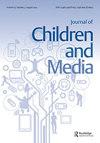Problematic online gaming, subjective health complaints, and depression among adolescent gamers from the United States: the role of console-gaming aggression
IF 2.1
3区 心理学
Q2 COMMUNICATION
引用次数: 1
Abstract
ABSTRACT The purpose of this study was to examine the longitudinal relationship between problematic online gaming and subjective health complaints and depressive symptoms, and the moderation of console-gaming aggression (i.e. verbal aggression, camping, trolling) in this relationship. Participants were 202 adolescents (86% boys; M age = 12.99 years) in the 7th or 8th grade who played first-person shooter games. They completed questionnaires on problematic online gaming, console-gaming aggression, subjective health complaints, and depressive symptoms. Six months later (Time 2), they completed questionnaires on subjective health complaints and depressive symptoms again. Findings revealed that problematic online gaming and console-gaming aggression were positive predictors of Time 2 subjective health complaints and depressive symptoms, while controlling for Time 1 levels and gender. Moderating effects were found as well, indicating that high levels of console-gaming aggression increased the positive relationship between problematic online gaming and depressive symptoms. These effects were also replicated for verbal aggression, problematic online gaming, and subjective health complaints. These findings suggest the importance of considering the implications of console-gaming aggression and problematic online gaming for the physical and mental health of adolescents. Impact Summary Prior State of Knowledge: Problematic online gaming and aggressive behaviors are linked to negative outcomes, including depression and subjective health complaints. Longitudinal research further supports this connection for depression, but not for subjective health complaints or various types of aggression via console games. Novel Contributions: Few studies have focused on various types of aggression and the longitudinal associations among problematic online gaming, depression, and subjective health complaints, while controlling for previous levels of depression and subjective health complaints. The present research addresses these gaps. Practical Implications: Findings of the present research has implications for clinicians and researchers concerned with identifying adolescents who might be at risk for negative outcomes.美国青少年游戏玩家中存在问题的网络游戏、主观健康投诉和抑郁:主机游戏攻击的作用
摘要本研究的目的是检验有问题的网络游戏与主观健康投诉和抑郁症状之间的纵向关系,以及在这种关系中主机游戏攻击(即言语攻击、露营、钓鱼)的适度性。参与者是202名玩第一人称射击游戏的7年级或8年级青少年(86%为男孩;M年龄=12.99岁)。他们完成了关于有问题的在线游戏、主机游戏攻击性、主观健康投诉和抑郁症状的问卷调查。六个月后(时间2),他们再次完成了关于主观健康投诉和抑郁症状的问卷调查。研究结果显示,有问题的在线游戏和主机游戏攻击性是时间2主观健康投诉和抑郁症状的积极预测因素,同时控制了时间1的水平和性别。还发现了调节作用,表明高水平的主机游戏攻击性增加了有问题的网络游戏与抑郁症状之间的积极关系。这些影响也被复制到言语攻击、有问题的网络游戏和主观健康投诉中。这些发现表明,考虑游戏机游戏攻击性和有问题的在线游戏对青少年身心健康的影响很重要。影响总结先前的知识状态:有问题的网络游戏和攻击性行为与负面结果有关,包括抑郁和主观健康投诉。纵向研究进一步支持了抑郁症的这种联系,但不支持主观健康投诉或通过游戏机进行的各种攻击。新颖贡献:很少有研究关注各种类型的攻击性以及有问题的网络游戏、抑郁和主观健康投诉之间的纵向关联,同时控制先前的抑郁和主观卫生投诉水平。目前的研究解决了这些差距。实际意义:本研究的发现对临床医生和研究人员有意义,他们关心识别可能有负面结果风险的青少年。
本文章由计算机程序翻译,如有差异,请以英文原文为准。
求助全文
约1分钟内获得全文
求助全文

 求助内容:
求助内容: 应助结果提醒方式:
应助结果提醒方式:


